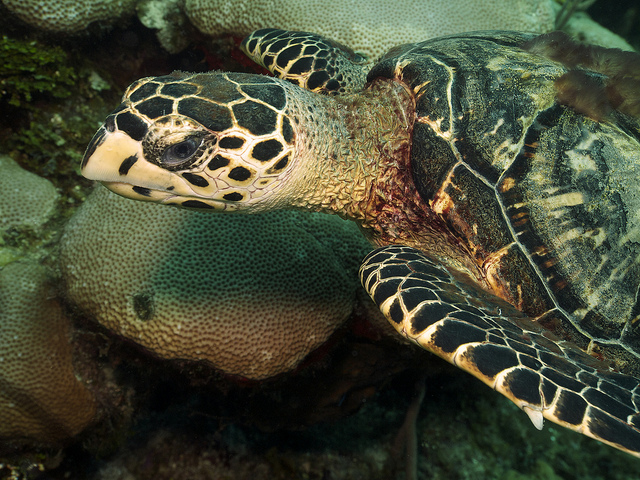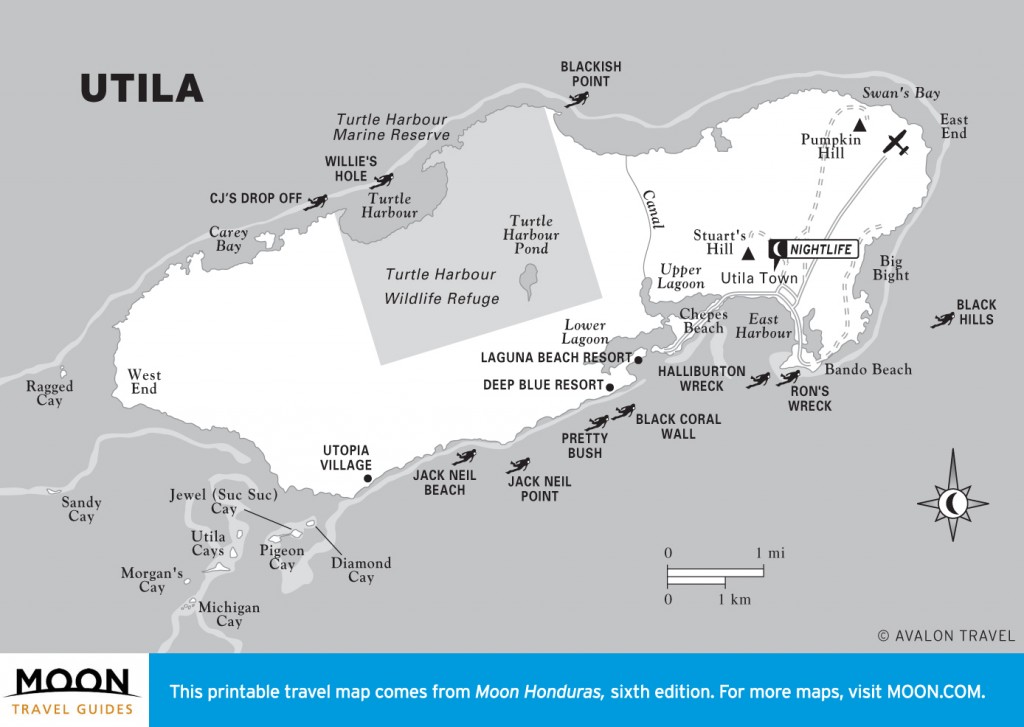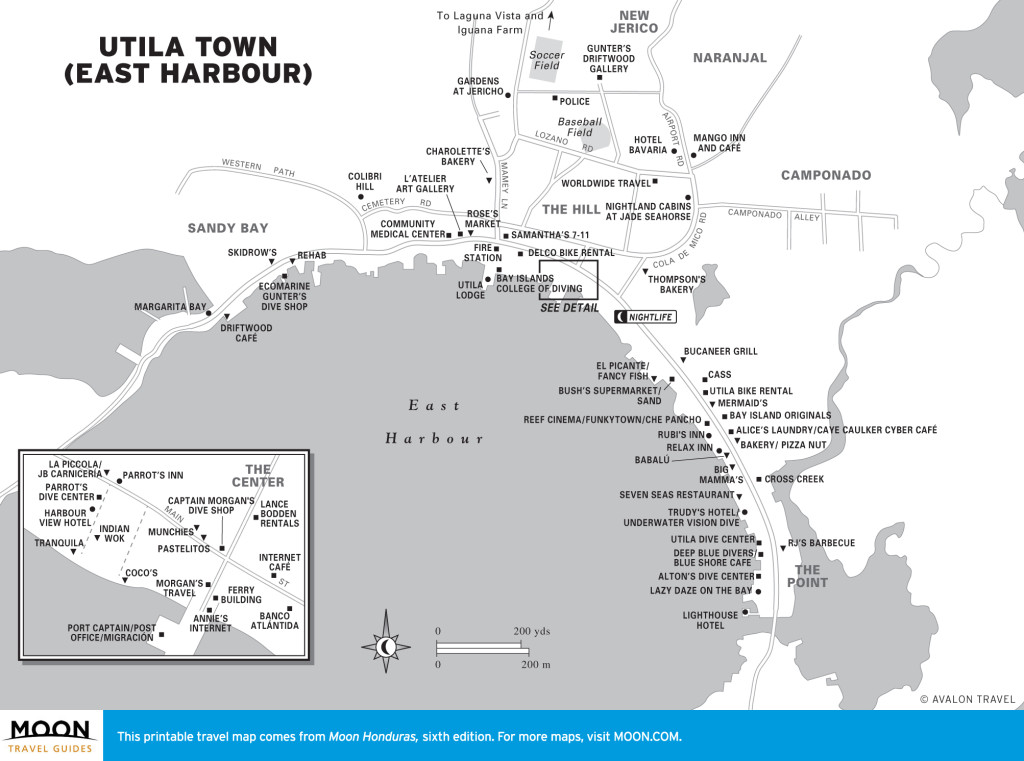
The endangered Hawksbill sea turtle is just one of the amazing creatures you can see while SCUBA diuving in Utila. Photo © stokes rx, licensed Creative Commons Attribution.
If there’s any complaint to be leveled against Utila, it’s that all anyone ever talks about is diving. All things considered, that’s no surprise. Word has gotten out that Utila offers one of the least expensive Open Water scuba certifications in the world, and business has been booming ever since. Competition between shops is fierce, with employees sometimes pursuing potential clients at the docks and on the streets. A whopping 14 shops were in business in Utila at last count. All the competition is wonderful news to the discerning would-be diver, who would be wise to ignore the touts that meet the ferries at the dock and instead spend a bit of time wandering through town, asking around among other travelers, and checking out several dive shops before deciding where to go and what courses to take.
Utila
Note: Although they are extremely rare, especially considering the very high number of divers passing through the Bay Islands, accidents—including fatal accidents—have occurred on both islands.×One advantage of making sure your dive shop is certified by PADI, SSI, or NAUI is that all accidents must be reported and investigated, while noncertified shops can simply fire the dive master/instructor and hire another.
It is certainly true that some shops are more diligent than others, particularly regarding quality of instructors and upkeep of equipment. Don’t make your decision based on price, or at least not exclusively, as most courses and dives cost about the same in the good shops—instead, focus on the background of the instructors (most important), the quality of equipment and boat, your rapport with the dive shop staff, and the quality of the accommodations.
Those who worry about decompression sickness will be glad to hear that Utila has its own hyperbaric chamber at the Bay Islands College of Diving (tel. 504/2425-3378, VHF channel 71).
Prices currently stand at US$270 for an Open Water or Advanced Open Water course, including accommodations. Those whose prices are slightly higher typically include more things—such as the required PADI notebook (US$7), the daily reef tax (US$4), and drinking water—or have better accommodations. Most classrooms have air-conditioning, which is key if you are on Utila in April or May. If you’re penny-pinching and plan to take advantage of the free accommodation offers, note that some of the dorms are cleaner and more pleasant than others, some have private bathrooms while others do not, and a few have hot water. If you are looking for a little more comfort (and a bathroom in your room), consider springing for a private hotel room, either at your shop’s affiliated hotel (many shops can get their students a discount) or at a hotel elsewhere in town.
Fun dives currently run US$55–65 for two (plus the reef tax), and 10-dive packages run US$270–300. Most shops have Open Water courses starting every day, available in English, Spanish, French, Italian, Dutch, and a surprising number of other languages as well—take the time to check it out if you are looking for a particular language. (Japanese? Check. Swiss German? Check.)
All the shops here are PADI-certified and have close to the same prices for all services.
A few shops have SSI or NAUI certification as well. Likewise, all will accept e-referrals, should you choose to take care of the theoretical part of your dive course online at PADI’s website.

Utila Town (East Harbour)
Alton’s Dive Center (tel. 504/2425-3704) was named by its former owner but is now run by a friendly German- Canadian couple who are especially committed to sound environmental practices. It is a PADI five-star shop, and also an IDC (Instructor Development Center). PADI certifications are of course available (US$299, including manuals, accommodations, two fun dives, and reef and certification fees), and Alton’s is the only shop on the island offering certifications with NAUI, an organization considered by many to have the highest standards for diving safety. Instructors typically have dive counts in the thousands, and readers have reported very positive experiences with the staff. There are kayaks and snorkel equipment available, but for an extra charge. The dorms are not the best in town, nor the cleanest, but acceptable, and they can be reserved online in advance, a plus if your visit will be during high season. Rooms with two twin beds are also available, usually given to couples traveling together. Additional nights (after your course is over) can be had for US$7 per person in the rooms with two twin beds, US$5 per person in the dorms. All fun dives are sold in sets of two (US$58), allowing the boats to go out farther—their fast boats go out at 8 a.m., can do two dives (an hour each) on the north side, and get back in time for lunch (although they have also been known to stop in the Utila Cays for lunch if divers wish). Boats go out again at 1:30 p.m., returning about 4:30 p.m. Packages of 10 dives can be purchased for US$265 (geared for backpackers) and US$300, the latter geared toward “resort divers”—folks who want a little more comfort, as they get their own dive guide, equipment reserved for the whole package, the privilege of making special requests like Nitrox and deeper dives, and transportation to and from the dive shop if they are not staying close by. The folks at Alton’s are passionate about whale sharks, and if it’s the season and the boat is headed to the north side for dives, a whale shark encounter might be had for no extra charge. Snorkelers who would like to tag along are charged US$20, including all snorkel gear.
Dive masters at Bay Islands College of Diving (BICD, tel. 504/2425-3291) are pros, and classes are kept small. They get new equipment every two to three years and are fastidious about its maintenance, and the shop is also committed to sound environmental practices. Like Utila Dive Centre and Alton’s, the college can certify divers all the way up to instructor level. The confined-water dives are done in the shop’s indoor pool—a plus for those studying to be instructors, but perhaps less appealing for those in the Open Water certification courses—unless, of course, the weather is bad, and then it’s great for everyone. There is also a Jacuzzi, ideal for relaxing at the end of a long dive day, especially during the cooler rainy season, and a rooftop bar. The only hyperbaric chamber and trauma center on Utila is located at this dive shop (in case you are unlucky enough to get the bends), although it is open to use for any diver in case of emergency. The free accommodations have significantly upgraded since BICD built its own—there are four individual apartments (each with a full kitchen) and two basic rooms, all with TVs, wireless Internet, hot water, and clean, nice bathrooms—reserve ahead in high season (US$20 for additional nights beyond the course). Air-conditioning is available for US$15 extra. There is even a fitness center onsite, open to anyone, US$4 per day or US$14 for a week. Prices here are competitive with the other shops (US$279 for the Open Water course, including accommodations, fees, and two fun dives). The classroom is large and airconditioned, and multimedia interactive lesson guides are used. This is also the dive shop that forms part of the very nice, but much pricier, Utila Lodge Dive Resort, and divers can use the pool table and sundeck of the lodge, and have a meal at the lodge’s buffet restaurant if they wish. Boats are spacious and well maintained.
Captain Morgan’s Dive Shop (office near the municipal dock in East Harbour, tel. 504/2425-3349) is a bit farther afield than most, run out of the Hotel Kayla on Jewel Cay, a small, tranquil island (with a bit fewer sand fleas) a half-hour boat ride from East Harbour. All rooms at the hotel have a private bath with cold water, wireless Internet, and there is kitchen, TV, and DVDs, as well as free use of the kayaks and good snorkeling gear (US$11 per night for non-divers). The shop, which has two dive boats, is a great place for those who prefer a quieter scene, and trips into town are easily arranged. Its location makes it a lot easier to reach some of the north coast dive sites, considered by many to be the island’s best, thanks to the better visibility. Whale sharks are found on the north side of the island too, as well as pilot whales and dolphins. The Open Water certification is US$268 including four nights accommodation, two fun dives, fees, and taxes. A two-tank fun dive is US$65, and a 10-dive package is US$310.
Outside of town, but just a US$1 taxi ride away, is Coral View, a brother and sister–managed shop that focuses on small group diving and has its own hotel (and restaurant, with so-so food). Kayaks and snorkel gear are available, the latter perfect for the great snorkeling found right off the hotel sundeck. There is also a pool, but it could use a little better maintenance. Open Water certification is US$279, a whale shark excursion is US$50, and kid-oriented dive courses like Bubblemaker are available.
Cross Creek (tel. 504/2425-3397) has the same owner as the Utila Dive Centre, but a different vibe, with an entire complex built over the lagoon stretching out behind the shop office. Equipment is serviced every month. The largest boat is 39 feet and can accommodate 20 divers (which would be a lot of people underwater at a dive site). They have prescription masks for contact lens wearers. Accommodations are on-site, the free dorm rooms in a long cabin with hammocks hanging in the breezeway. Rooms are acceptable, although not spotless, and a few have their own bathroom (although both the shared and private bath are cold water only), and some even have air-conditioning. All have access to a shared kitchen. There’s a separate dive master cabin with hot water and—a big step up—four “deluxe” rooms, in separate cabins built on decks over the mangroves and lagoon, with TVs, air-conditioning, and mini-fridges (but still no hot water). The deluxe rooms are free for one night only with a course, then US$15 for additional nights. The Open Water course is US$275, and in addition to the usual perks, Cross Creek throws in a T-shirt and a drink voucher. Hopefully you’re not paying with plastic though, because the staff I spoke with informed me that there is an additional 8 percent charge for payment with credit card (charging a fee for payment with credit card is actually illegal in Honduras, but many vendors do it anyway).
Deep Blue Divers (tel. 504/2425-3211) is a five-star Gold Palm IDC Center, meaning that certification all the way through dive instructor is offered here. Divers here tend to be a little less about the partying and a little more about the diving, with many on the plus side of 25. The Open Water certification is US$262 here, including all materials, certification, two fun dives, and five nights accommodation in their simple hotel. Seven rooms (two of them dormstyle) are around a big kitchen and living area with a common TV, there are three shared (and rather worn) bathrooms, one of which has hot water, a big upper porch with a hammock to relax in, and wireless Internet. The dive shop has sundecks along the water’s edge, and guests have free use of kayaks. Additional nights are just US$8, and non-divers can stay here for US$10. Class size is limited to just four (although an exception can be made if a group of five friends wants to have the class together).
Ecomarine Gunter’s Dive Shop (in Sandy Bay, tel. 504/2425-3350) offers the beginner’s Open Water course for US$259 including two fun dives as well as accommodation (but not including the US$4 per day reef tax). Gunter’s is renowned for its great staff and small diving groups; just don’t expect much from the free accommodations. Students are put up in the Backpacker Lodge across the street, which is very basic (bare light bulbs, cold water only)—you may want to pay to stay elsewhere. Kayaks are available for rent (US$17–25), and non-divers can ride out on dive boats for a snorkel trip for US$15 (including equipment rental), or rent snorkel equipment from here to take to Blue Bayou (US$10 for half a day rental, US$15 for all day). Unique at Gunter’s is Apnea Total (tel. 504/2425-3350), a specialty shop within the shop, which teaches free diving: diving without a tank. It’s run by Mark “Tex” Rogers, the only free-diving instructor in the Bay Islands, and teaches those looking for a thrill how to hold their breath underwater for extended periods of time—five minutes or more for the record holders. Tex is a friendly, easygoing guy who instills confidence in his students while teaching them to push their limits.
Parrots Dive Centre (tel. 504/2425-3772) is a PADI five-star, locally owned dive shop, with a few of those rarest of breeds—native Utilian dive instructors. The Open Water certification here costs US$279 including five nights accommodation and a trip to Water Cay at the end of the course. There is now a second set of rooms at the Parrots Inn, to accommodate the shop’s growing clientele, which increased by a remarkable 412 percent between 2009 and 2010. All that growth can never be without its kinks— do check the equipment carefully before signing up for a course to make sure it’s in good condition. On the plus side, Parrots has new, nice, air-conditioned classrooms for the theory portion of the course. Some of the rooms have a private bath, others share, but all have two fans per room, wireless Internet, and access to the common kitchen. For non-divers, or those looking to stay beyond their course, rooms are just US$5 (a room doesn’t get any cheaper than this!). Those looking for slightly more upscale accommodations can stay at Margaritaville, a five-minute walk down the road (US$15), or at Rubi’s Inn (US$20) when diving with Parrots. They have opened their own restaurant, Friendly Girl’s Café, with “Utilian food at backpacker prices”—this is one place where you can try “bando soup” (Utilian fish stew). Kayaks and snorkeling are free for divers, and a snorkel tour for non-divers is just US$5 including equipment. For those who like to be in the thick of things, Parrots is also appealingly located on the same pier as Tranquila Bar and the Indian Wok. One of the things that we like best about Parrots is their commitment to the community—one of the ways they show it is by providing free dive training to local kids, so that those kids can grow up to be dive masters and instructors as well.
Underwater Vision (tel. 504/2425-3103) is also locally owned, set on the East Harbour beachfront, around a large patch of sand (volleyball net included). The one-day Discover Scuba Diving class is US$80, the beginner’s Open Water course is US$299, and two fun dives are US$63. At the time of our visit, the shop had recently bought new boats and equipment (pretty big boats in fact—expect to go diving with a number of others), and was extending their dock to build a new sundeck. Free accommodations are at the adjacent Trudy’s Hotel, which offers hot showers to guests in the dorms; priceless at the end of a diving day during the rainy season, and the hotel also has a beach volleyball court, night security, and a bar and restaurant. Private rooms are also available, US$30 for dive students, US$40 otherwise, with funky fish murals, ceiling fans, polished wood floors, and hot water (basic private rooms are also available in the dorm building). The breezeway shelters Adirondack chairs and hammocks, perfect for relaxing at the end of a challenging day. There are also private rooms with rather grimy, cold-water showers, which can be had as part of the free accommodations in lieu of the dorm. Tuesday is chicken wings night, and islanders flock here for the delicious wings (often heading afterwards to Tranquila Bar for Tequila Tuesdays).
Utila Dive Centre (UDC, on the Point, tel. 504/2425-3326), the first dive shop opened on the island, in 1991, is highly respected and, according to experienced divers, has the best boats on the island. It is also one of the four IDCs on the island—shops where divers come to be taught to be instructors— so you can be sure of getting experienced dive masters and instructors. Frequent northside trips on two 12-meter cabin cruisers are offered; dorm accommodations are at the Mango Inn, including a simple fruit and toast breakfast (those who wish can pay a charge to upgrade from the dorms to a better room). While the beginner’s Open Water certification (US$299) is a 3.5-day course at most shops, UDC likes to provide a more relaxed pace, taking 4.5 days, and four nights’ accommodations are included rather than three. Trimix is available for those interested in deeper diving. They have kayaks free for their divers to use, and there is good snorkeling right around their dock. The shop also rents out sea kayaks and offers dive trips to the Cayos Cochinos.
Shops selling dive gear include Cross Creek, Utila Dive Centre, and Bay Islands College of Diving, and there is a shop selling mares gear right on the main drag through town. For more information on dive shops and diving in Utila, check out the website.
Excerpted from the Sixth Edition of Moon Honduras.